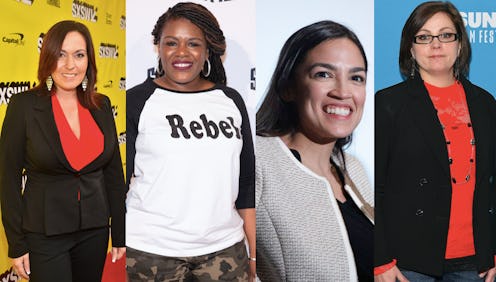News
How "Knock Down The House" Nailed What It's Like To Campaign As A Woman & An Outsider

When she started filming the Netflix documentary Knock Down The House, director Rachel Lears did not know she'd be documenting the rise of a political star. She set out to follow four campaigns for Congress: Alexandria Ocasio-Cortez of New York; Cori Bush of St. Louis, Missouri; Amy Vilela of Las Vegas; and Paula Jean Swearengin of Coal City, West Virginia. More than just a portrayal of Ocasio-Cortez's journey, Knock Down The House weaves these four women's attempts to pitch themselves to voters into a story of the personal sacrifice and grueling work necessary to mount outsider challenges against "political machines."
Lears tells Bustle that she set out to document grassroots campaigns where a "regular person" would be "going through this transformative process of becoming a candidate." She wanted to follow candidates who rejected corporate money; ran their campaigns with volunteer labor and "their own hustle," as she puts it; and relied on contributions from small donors.
"[I]t's almost like being a woman running for the seat — that automatically makes you an outsider."
The way the documentary portrays grassroots campaigning is "really true to what the experience was," according to Vilela. She ran in Nevada's 4th Congressional District on a platform that prioritized shoring up social programs, following the death of her daughter, Shalynne, who was allegedly denied hospital care because of her insurance status (Centennial Hills Hospital has said that Vilela's daughter's insurance status "played no role in the care and treatment she received").
"I think the film does a really good job of capturing that," Vilela tells Bustle. "Capturing the struggle, the pushback, and also the emotional aspect of running and fighting...power in terms of money, but also power in terms of being a woman running in a field of mainly dominated by men."
For Bush, a Black woman who ran against incumbent Democratic Rep. William Lacy Clay in Missouri's 1st Congressional District, it was more than just her grassroots style of campaigning that set her apart from her rivals. "Part of being in my district, it's almost like being a woman running for the seat — that automatically makes you an outsider," she tells Bustle.
A crucial thread that ties the stories of these candidates together is that all four women supported each other from afar, from visiting Washington, D.C. together to staying in touch through election night. "I really love the idea that [it's] people from different parts of the country who share the common ground of...understanding the struggles that people go through in their community," Lears says.
Of the four women whose campaigns Knock Down The House follows, only Ocasio-Cortez won her election. She calls Vilela on election night in the film and tells her, "It's just the reality that in order for one of us to make it through, a hundred of us have to try."
Vilela acknowledges that her loss was "very emotional," but she says the progressive movement she and the other candidates represented is winning the national conversation. She points out that Democrats vying for the 2020 presidential nomination are taking seriously the very issues that they fought for in their campaigns, like fixing the health care system and tackling climate change.
"Movement doesn't happen overnight, it takes time," she says. "Like Alexandria was saying, it takes many of us. Going out there [and] hitting back, and keep on hitting 'til we knock down those barriers."
Ocasio-Cortez's win also underscores that it's indeed possible for a long-shot grassroots campaign with the right message to emerge victorious against an incumbent.
"It shows that you can look totally different than what they want to see, you can speak different and be from a different place, you can be the underdog and not have the money that people believe you should have," says Bush, who in January announced her bid to take on Clay again in 2020.
"It may not happen to everybody at once," Bush adds. "But for us, we’re going to keep going."